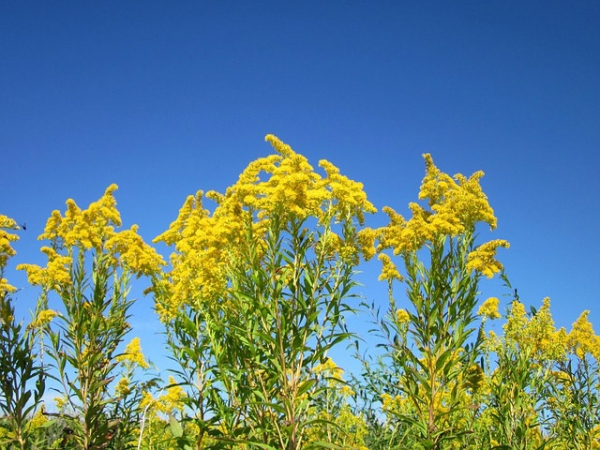Goldenrod Essential Oil
Solidago canadensis
Known Uses
Goldenrod’s scientific name Solidago is derived from the Latin word meaning ‘to make whole’ because the plant has traditionally been used to support the cardiovascular system, urinary tract, and liver function. It is also calming for the body and mind and has been used as an aphrodisiac. You can diffuse goldenrod essential oil into the room for a relaxing effect and to get rid of nasty odors as its spicy citrus scent fills the air.
Goldenrod essential oil has been historically used to treat bladder and urinary tract infections. As a diuretic, it increases the frequency and quantity of urination. Its astringent and antiseptic properties also help cleanse the urinary tract. It also helps tone up the kidneys.
Diluted with a carrier oil, goldenrod essential oil can be used to treat skin conditions such as eczema and acne. Once again, its astringent (cleansing) and antiseptic (anti-infection) properties cause it to be quite effective in keeping skin in a healthy, youthful and good condition. Goldenrod oil, when diluted with a carrier oil like coconut oil or olive oil, can bring relief to bug bites and help to heal minor wounds to the skin.
It has been employed in the treatment of tuberculosis and asthma as well as other respiratory ailments such as seasonal allergies like hay fever. It acts as an expectorant and can be directly inhaled or diffused into the room to help break up sinus congestion.
As an anti-inflammatory, goldenrod essential oil has proven to relieve gout, joint pain, and arthritis, as well as having the ability to relieve muscle spasms. Goldenrod relieves inflammation of the mouth and throat and has been applied directly to the skin to hasten the healing of wounds. It is known to be a diuretic and will increase urine flow, aid in the treatment of diabetes, enlarged liver, hemorrhoids, and enlarged prostate. It has also been used to stop internal bleeding.
History
The plant is native to Canada, Mexico and the USA as well as to parts of Europe. It is usually the essential oil from the Canadian plant (Solidago canedenis) that you buy commercially. There is evidence that Native Americans treated toothache and sore throats by chewing on its leaves and roots. They also used parts of the plant to create treatments for insect bites. Traditionally goldenrod has been used to treat urinary tract infections and bladder infections.
Warning
Until there is more documented information regarding goldenrod essential oil, avoid using it if you are pregnant or breastfeeding. Also avoid using goldenrod oil if you are allergic or sensitve to ragweed, chrysanthemums, marigolds, daisies, and others in the same family. If you have allergies, be sure to check with your healthcare provider before taking goldenrod.
“Irrigation therapy” is a process in which goldenrod is taken while drinking generous amounts of water or fluids to cause an increase in urine discharge. This process should not be undertaken by people with kidney or heart disease and suffering from fluid retention. There is also a concern that goldenrod might make the body accumulate more sodium, and this can make high blood pressure worse.
Diuretic drugs such as chlorothiazide (Diuril), chlorthalidone (Thalitone), furosemide (Lasix), hydrochlorothiazide (HCTZ, Hydrodiuril, Microzide), and others interact with goldenrod and might cause the body to expel excessive amounts of water. When the body loses too much water, it can cause dizziness and decrease blood pressure, making it go too low.

